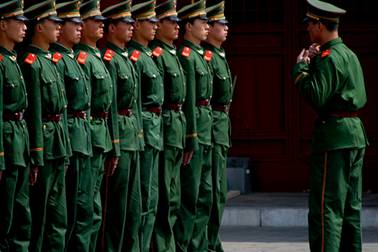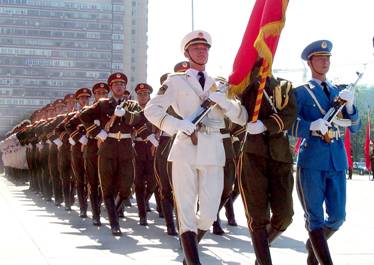Special Topic: Finding and Keeping Jobs in China
The next few months represent crunch time for just over 7 million young Chinese people, 6 million of whom will graduate from university this year and a further million who graduated last year and have yet to find gainful employment. If you read my recent column about the findings of Hudson’s recent survey, you will know that only 30% of the companies surveyed plan to hire new employees in the second half of 2009, which means that millions of these graduates face the prospect of a long, hot summer of job-hunting, with no guarantee they will be able to secure any form of employment.

Photo: lafayette1
In my last article, as something of a footnote, I mentioned that because the problem of graduate and urban unemployment could grow to unprecedented heights, the government is looking to get involved. Sadly, this will not involve some master plan to stimulate the economy enough to create a few million extra jobs. Instead, it is looking to put in place several initiatives that would offer jobless graduates an alternative to joblessness and depression. The examples I used included universities increasing opportunities for post-graduate study in an effort to delay some of the 6 million entering the job market, and, incentives for young graduates to take up positions in rural areas as teachers.
With graduation day looming for the millions of graduates, the early signs are that whilst a healthy percentage of graduates have already found jobs, there will still be a huge amount scouring sites like zhaopin.com with increased desperation. According to the Ministry of Education, around 68% (approximately 4.1 million) of graduates had found jobs by the end of June. This is certainly a promising figure. However, in 2008, with well over one million less graduates – there were around 5.8 million – the number was slightly higher with 73% finding work. We must also note that the 68% is of students graduating this year and does not include the 1 million or so left over from last year. This currently leaves China with an employment shortfall of approximately 3 million graduates. Obviously, as many students have only graduated in the past few weeks, the 3 million will certainly shrink. The question remains, though, by how much?
For the many students who have not secured a job yet, the initiatives introduced by the government will begin to look increasingly tempting – especially when compared to unemployment. One of the most intriguing options for young graduates is to swap mortar boards for fatigues and join the People’s Liberation Army. Traditionally, the PLA has taken its recruits from the ranks of high school graduates and the unemployed. However, now, with the job market in flux, military leaders are looking to come up with a scenario that is beneficial to the army, but could also help with the graduate employment situation.

Photo: US Department of Defense
The PLA announced plans this summer to offer places to 120,000 graduates who will do a two-year stint. The army hopes that this influx of fresh talent will allow it to modernize its 2.3 million strong forces. Bai Zixing, director of the Defense Ministry’s recruitment office told China Daily that the new blood would help meet the army’s need for information skills to operate the PLA’s increasingly sophisticated equipment. He said, “The better education the enlisted personnel have, the better abilities to learn new tasks and operations they will gain.” He also believes that more graduates in the ranks will reduce the education gap between enlisted personnel and commissioned officers – the majority of commissioned officers have at least three years of studies at military academy. Hou Qishan, a recruitment official at the Ministry of National Defense, also told China Daily, “This is amazing for recruitment. We never had so many choices before. We only recruited 39,000 college graduates last year.”
Thus far, the early signs have been good for the plan. An officer named Shu, told Xinhua that, “The application numbers and the enthusiasm have both exceeded last year. Young people think the military and the government is doing them a favor.” The popularity of the scheme is also probably heightened less by patriotic fervor than by the fact that many students will clearly see it as a safety net. Any student that signs-up for the scheme is not 100% committed; they can decide not to pursue their interest if they manage to find a job between signing up and November, when the recruits will actually enroll. Chen Jinan, an army recruiter in Beijing said, “The army is still just an alternative for them. It’s unpredictable to see how many will stick to the army by the end.”
Special Topic: Finding and Keeping Jobs in China
***
Related Links
PLA Navy Parade-In Pictures
Strongest in Asia, but Job-Market Still Looking Weak
Gloomy Outlook for Class of 2009
Warning:The use of any news and articles published on eChinacities.com without written permission from eChinacities.com constitutes copyright infringement, and legal action can be taken.
All comments are subject to moderation by eChinacities.com staff. Because we wish to encourage healthy and productive dialogue we ask that all comments remain polite, free of profanity or name calling, and relevant to the original post and subsequent discussion. Comments will not be deleted because of the viewpoints they express, only if the mode of expression itself is inappropriate.
Please login to add a comment. Click here to login immediately.